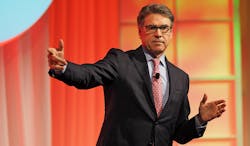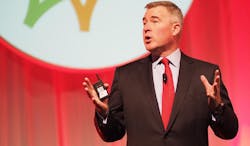Former Gov. Perry on business: Find out why people choose your competitors
DALLAS. It makes sense Omnitracs sought out former Texas Gov. Rick Perry to keynote its user conference on Monday this week. The Iowa Caucus was going on, so it's good to hear from one who's been a candidate in that race, but the hope was he'd share a strategy or two from his 14-plus years as CEO of a state.
"I talked about Omnitracs' transformation and what we're about. There's a guy who transformed Texas," Omnitracs CEO John Graham said of Perry. "And it's always good to hear from a leader — kind of see how do they click, what can I take away?"
Here's one thing: Perry said he and his administration looked for ways to strengthen Texas by searching out the reasons why businesses chose other states to locate instead. They found one company had passed on Texas cities and picked Chicago in the early 2000s for its new headquarters, for example, partly because the spouses of decision-makers found the arts and cultural scene more alluring there.
Every such instance can be instructive to a state, just like it can be for businesses looking to compete to win customers. Perry said he told his staff at that point they needed to give up on business development altogether — or get good at it.
Competition
Continuing on the theme of competition, Perry noted that people and businesses — just like potential clients you either sell or don't sell — vote with their feet. "When businesses figure out where they want to be located, just like when you figure out where you want to live, they make a decision by looking at things like taxes, regulations, legal systems and education. Education basically says, 'skilled work force.'"
Education was an area Perry said his administration targeted for improvement. In 2003, the Texas high school graduation rate was 27th-highest in the nation, he pointed out.
"We were about in the middle," Perry told listeners, "and we decided we could do better." To make improvements, however, he said the state needed to address its diverse population and Texas students' particular learning needs.
"Texas public schools became 'majority minority' in the year 2000. The kids we're teaching in our public schools are really diverse," Perry said. "The schools in Connecticut? The kids look a lot different there than the kids in public schools in Texas."
"So I think it makes sense for the states to deal with their education issues," he asserted.
WATCH VIDEO: SEVEN CLIPS OF FORMER GOV. RICK PERRY
The Perry Administration's plan for schools included a "substantial" expansion of charter schools, an incentive pay program for teachers, and testing students "to find out when they're having challenges so you can intervene at an early stage and make a difference," the former governor contended.
Putting those things in place, he added, helped Texas schools get more competitive compared with others across the nation. "And by 2013 — that's a 10-year period of time — Texas had the second-highest high school graduation rates in America. Think about that; that is a very short period of time to make that massive of a change," Perry said.
"Kids who wouldn't have graduated high school were graduating, and now they're part of our skilled work force waiting for opportunity."
Checklists
Perry contended that things like better-ranking schools help convince companies like Omnitracs and Toyota — which "ended up just up the road in Plano" in late 2014 — to move headquarters into Texas. Omnitracs' CEO Graham had just explained to the audience that Texas was a better fit geographically for the company to serve its multinational client base and the state is also a place where transportation is being innovated.
"There are reasons Omnitracs and Toyota and other companies relocated to Texas," Perry said. "It wasn't some perchance event — they had a thoughtful process. They had a checklist they went through to make a decision about why they came to Dallas to expand their business.
"You do use checklists, whether you run a business or you're living your life," he continued. There are all kinds of checklists, Perry added — it's things you do as a framework, so it could be the steps you go through before leaving home each morning. (As foundational "checklists" to follow, Perry suggested the U.S. Constitution and the Bible.)
Whatever they may be, those checklists are what organizations need to understand and go after when finding ways to beat the competition, according to Perry.
"You'll figure out where you want to live, just like Omnitracs figured out where they wanted to be headquartered," he contended. "That's what we did in this state over that 14-year period of time that I had the great privilege to be governor: We put policies in place that made the state competitive. We believed the states should be competing against each other."
Again intertwining business and political issues — and returning to a discussion of the U.S. Constitution — Perry noted his belief that the country has gotten "a fairly far distance from" the federal-state framework that that document envisions.
"Competition is a good thing. I will suggest to you that if we get back to that in this country — if Washington will do those few things [enumerated in the Constitution] and do those few things well, and leave the states to compete, to create these competitive environments — we will be a substantially more competitive country.
"All these social issues that seem to rip the fabric of the country apart, let the states figure those out," he said.
Got culture?
The former governor returned to ways to improve an organization or state, as the case may be, and said luring businesses to Texas helped diversify the state's economy away from an all-or-nothing dependence on the oil and gas industry.
"We helped bring diversity to the economy — the manufacturing, the medical and technical innovation — including with companies like Omnitracs. All of that occurred from the mid-1990s on and it made the state very, very diverse," he told listeners. "Economically, we're a diverse state; ethnically we're a diverse state. Culturally we're a diverse state. Geographically we're a diverse state."
How about that loss of a new business headquarters to the Windy City? Again, his administration discerned that the loss was at least partly because "the cultural arts were more expansive or appropriate for them in Chicago than in DFW," Perry said.
If you want to compete, things like that are your target, he advised. "Here's what I'll tell you: during the decade of the 2000s, with the policies that were put into place, Fort Worth built a new museum of modern art," he said. "The Basses built one of the finest symphony halls in the world. The Kimbell Museum expanded its footprint by a substantial margin.
"Fort Worth has one of the great zoos in the world, as does their neighbor, Dallas.
"And speaking of Dallas," he continued, getting back to the conference's host city, "they have two performing arts facilities, the AT&T and the Meyerson. The Nashers moved their sculpture garden here from California, I might add.
"The Perots built one of the great natural science museums in the world. The largest cultural arts district in America is in this city: It's 68 acres.
"The little government university town that I lived in for 14 years [i.e., Austin] built a new museum of modern art and a new performing arts facility. The only Formula 1 track in America is in Austin, TX.
"San Antonio built a new performing arts facility. And tonight in Houston, TX, as it is every night, there are more theater seats available than in any other city in America outside of New York City."
So what's the takeaway? "No company that's thinking about relocating ever says the cultural arts are one of the drawbacks in this state now," Perry said.
"And think about it: That happened in a decade. That's what can happen when you use a checklist and you truly believe in it and that document that is the foundation — in this case, the U.S. Constitution."
About the Author
Aaron Marsh
Aaron Marsh is a former senior editor of FleetOwner, who wrote for the publication from 2015 to 2019.

